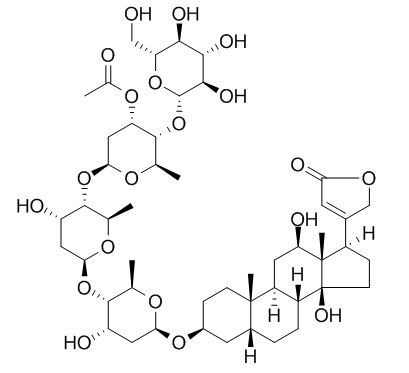Lanatoside C
Lanatoside C, a cardiac glycoside, possesses the ability to inhibit the interchange of Na and K across cell membrane and is widely used to treat anti-arrhythmias and heart failure. Lanatoside C can effectively inhibit all four serotypes of dengue virus, flavivirus Kunjin, alphavirus Chikungunya and Sindbis virus as well as the human enterovirus 71, suggest that lanatoside C possesses broad spectrum antiviral activity against several groups of positive-sense RNA viruses.
Inquire / Order:
manager@chemfaces.com
Technical Inquiries:
service@chemfaces.com
Tel:
+86-27-84237783
Fax:
+86-27-84254680
Address:
1 Building, No. 83, CheCheng Rd., Wuhan Economic and Technological Development Zone, Wuhan, Hubei 430056, PRC
Providing storage is as stated on the product vial and the vial is kept tightly sealed, the product can be stored for up to
24 months(2-8C).
Wherever possible, you should prepare and use solutions on the same day. However, if you need to make up stock solutions in advance, we recommend that you store the solution as aliquots in tightly sealed vials at -20C. Generally, these will be useable for up to two weeks. Before use, and prior to opening the vial we recommend that you allow your product to equilibrate to room temperature for at least 1 hour.
Need more advice on solubility, usage and handling? Please email to: service@chemfaces.com
The packaging of the product may have turned upside down during transportation, resulting in the natural compounds adhering to the neck or cap of the vial. take the vial out of its packaging and gently shake to let the compounds fall to the bottom of the vial. for liquid products, centrifuge at 200-500 RPM to gather the liquid at the bottom of the vial. try to avoid loss or contamination during handling.
Ann Transl Med.2019, 7(23):731
J Microbiol Biotechnol.2024, 35:e2408022.
Braz J Med Biol Res.2021, 54(12):e11183.
Separations2023, 10(4),255.
Front Plant Sci.2017, 8:723
Int J Mol Sci.2019, 20(16):E4015
Microchemical Journal2014, 203:110804.
J Ethnopharmacol.2024, 326:117902.
Front Plant Sci.2018, 9:1424
Vojnosanit Pregl2016, 75(00):391-391
Related and Featured Products
Sci Rep. 2017 Apr 7;7:46134.
Lanatoside C, a cardiac glycoside, acts through protein kinase Cδ to cause apoptosis of human hepatocellular carcinoma cells.[Pubmed:
28387249 ]
Recent studies have revealed that cardiac glycosides, such as digitalis and digoxin, have anticancer activity and may serve as lead compounds for the development of cancer treatments.
The poor prognosis of hepatocellular carcinoma (HCC) patients reflects the development of resistance to current chemotherapeutic agents, highlighting the need for discovering new small-molecule therapeutics.
METHODS AND RESULTS:
Here, we found that Lanatoside C, an anti-arrhythmic agent extracted from Digitalis lanata, inhibited the growth of HCC cells and dramatically decreased tumor volume as well as delayed tumor growth without obvious body weight loss. Moreover, Lanatoside C triggered mitochondrial membrane potential (MMP) loss, activation of caspases and translocation of apoptosis-inducing factor (AIF) into the nucleus, which suggests that Lanatoside C induced apoptosis through both caspase-dependent and -independent pathways. Furthermore, we discovered that Lanatoside C activated protein kinase delta (PKCδ) via Thr505 phosphorylation and subsequent membrane translocation.
CONCLUSIONS:
Inhibition of PKCδ reversed Lanatoside C-induced MMP loss and apoptosis, confirming that Lanatoside C caused apoptosis through PKCδ activation. We also found that the AKT/mTOR pathway was negatively regulated by Lanatoside C through PKCδ activation.
In conclusion, we provide the first demonstration that the anticancer effects of Lanatoside C are mainly attributable to PKCδ activation.
Antiviral Res. 2014 Nov;111:93-9
Antiviral activity of lanatoside C against dengue virus infection.[Pubmed:
25251726 ]
Dengue infection poses a serious threat globally due to its recent rapid spread and rise in incidence. Currently, there is no approved vaccine or effective antiviral drug for dengue virus infection.
In response to the urgent need for the development of an effective antiviral for dengue virus, the US Drug Collection library was screened in this study to identify compounds with anti-dengue activities.
METHODS AND RESULTS:
Lanatoside C, an FDA approved cardiac glycoside was identified as a candidate anti-dengue compound. Our data revealed that Lanatoside C has an IC50 of 0.19μM for dengue virus infection in HuH-7 cells. Dose-dependent reduction in dengue viral RNA and viral proteins synthesis were also observed upon treatment with increasing concentrations of Lanatoside C. Time of addition study indicated that Lanatoside C inhibits the early processes of the dengue virus replication cycle. Furthermore, Lanatoside C can effectively inhibit all four serotypes of dengue virus, flavivirus Kunjin, alphavirus Chikungunya and Sindbis virus as well as the human enterovirus 71.
CONCLUSIONS:
These findings suggest that Lanatoside C possesses broad spectrum antiviral activity against several groups of positive-sense RNA viruses.
Neuro Oncol. 2011 Nov;13(11):1213-24.
Lanatoside C sensitizes glioblastoma cells to tumor necrosis factor-related apoptosis-inducing ligand and induces an alternative cell death pathway.[Pubmed:
21757445 ]
Human glioblastoma (GBM) cells are notorious for their resistance to apoptosis-inducing therapeutics.
METHODS AND RESULTS:
We have identified Lanatoside C as a sensitizer of GBM cells to tumor necrosis factor-related apoptosis-inducing ligand (TRAIL)-induced cell death partly by upregulation of the death receptor 5. We show that Lanatoside C sensitizes GBM cells to TRAIL-induced apoptosis in a GBM xenograft model in vivo. Lanatoside C on its own serves as a therapeutic agent against GBM by activating a caspase-independent cell death pathway. Cells treated with Lanatoside C showed necrotic cell morphology with absence of caspase activation, low mitochondrial membrane potential, and early intracellular ATP depletion.
CONCLUSIONS:
In conclusion, Lanatoside C sensitizes GBM cells to TRAIL-induced cell death and mitigates apoptosis resistance of glioblastoma cells by inducing an alternative cell death pathway. To our knowledge, this is one of the first examples of use of caspase-independent cell death inducers to trigger tumor regression in vivo. Activation of such mechanism may be a useful strategy to counter resistance of cancer cells to apoptosis.



